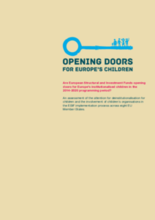Executive Summary
Across Europe hundreds of thousands of children are growing up in institutional care. The consequences are devastating for children, devastating for families and ultimately, devastating for society as a whole.
The Opening Doors for Europe’s Children Campaign seeks to improve the quality of life of children and young people in, at risk of entering, or leaving institutional care across Europe by promoting the transition from institutional to family-based care, also called deinstitutionalisation (DI). Through coordinated advocacy at national and EU level we aim to support reforms that will prevent separation of children from their families and will offer high quality alternatives where separation is in the child’s best interest.
Explicit mention of deinstitutionalisation as a funding priority for European Structural and Investment Funds (ESIF), may provide the much needed financial incentive to catalyse comprehensive systems reform in EU Member States. At the beginning of any DI process it is necessary to ensure ‘double-running costs’. EU money is ideally suited to support such transition costs, since after completion of DI, the overall burden on public expenditure is likely to be equal to or less than the cost of running an institutional system, with much improved outcomes for children and families.
This report is based on the outcomes of a survey addressed to eight National Coordinators of the Opening Doors campaign. It aims to assess the extent to which EU Member States have used ESIF to catalyse child care systems reform by evaluating Partnership Agreements (PAs) and Operational Programmes (OPs) and the extent to which the ex-ante conditionality and Partnership Principle were honoured. Given that the Common Strategic Framework for ESIF funds makes a strong link to the European Semester process, we also considered that from the DI perspective.
Reviewed by EuroChild and Hope and Homes for Children. Survey addressed to eight National Coordinators of the Opening Doors for Europe’s Children Campaign

